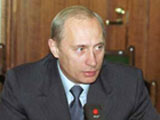“Japanese model”: Russian version
 President Putin is searching for “switchmen” (the new Cabinet and the Parliament) to lay the responsibility for unpopular reforms on them.
President Putin is searching for “switchmen” (the new Cabinet and the Parliament) to lay the responsibility for unpopular reforms on them.
On April 8 President Putin had a meeting with the leaders of the both Chambers of Russian Parliament: the Council of Federation and the State Duma. The Duma was represented by Vladimir Gryzlov (the leader of “United Russia”), Gennady Zyuganov (Communist Party) and Dmitry Rogozin (“Rodina” (Motherland).

Leader of LDPR Party Vladimir Zhirinovsky skipped the meeting with the President. There are rumors that he lost interest in politics and is thinking of a career shift, he allegedly plans to become an expert.
During the meeting, Vladimir Putin named the points the Parliament should concentrate on. They all are so called “unpopular measures”, including abandoning the promises which were given earlier to some categories of Russian people, and there are no funds for their implementation.
President Putin called the policy on mortgage among his priorities. The policy on mortgage can hardly increase the popularity of United Russia pro-presidential party having majority of seats in the State Duma. Amendments allowing to take over the debtor’s apartment (even if this is the only apartment the person has), must be made in the legislation. Without this amendment, banks refuse to decrease interest rate (they say that mortgage today is highly risky operation). Some experts predict that mortgage interest rate is unlikely to fall even after passing the amendment.
The next point of the Kremlin’s plan is increasing the tax burden on the businesses in the spheres of natural resources.
What do “unpopular measures” mean?
Russian people heard much from the authorities about the ideas to double GDP, reform the Army, education and health care. They support the ideas and do not go deeply into details. They should have a closer look at these issues.
People felt the first changes on their pockets: the prices for some foodstuffs grew by 10 percent in March. Muscovites found themselves in the worst position. After April 1, residents of Moscow faced 40 percent growth of the fare in public transport and suburban electric trains (in addition to the constantly growing utility bills). Prices for gas at Moscow gas stations will be increased by 40-50 kopeck per litter, according to the statement made by Moscow Fuel Association. Air ticket prices will grow by 5 percent in all the regions of Russia.
The new Cabinet is proposing significant increase of the real estate tax.
One more “present” for the poor – after April 11 the authorities will be able to take people out of their apartments if people fail to pay their debts on utility bills until this date.
Some other unpopular innovations have been proposed, such as taking off additional 4 percent from people’s salaries to the pension fund, canceling special low fares for pensioners and low utility fees for some categories of people. Most experts say all this can deprive pensioners and the poor the remains of the feeling of stability.
Young people will be also “taken care off”. The General Staff announced about its intention to cancel postponement for students from mandatory military service. Secondly, the State Duma cancelled the mandatory rule for universities to have minimum 25 percent of students whose tuition is paid by the state budget.
Health care services are going to become more expensive as well.
Japanese model in Russia
Putin’s program reminds Japan in 1955, when the motto to increase GDP twofold in 10 years was put forward, the Kommersant-Vlast wrote. Japanese authorities were saying that high tempos of growth and big GDP are necessary for raising the status of Japan in the world. However, Japan did not put forward the slogan of “fighting poverty”, unlike Russia. No country in the world had rapid economic growth accompanied with maintaining stable low level of public expenditures and constant decreаse of national income (salaries and bonuses). Moreover, the economic growth in Japan was followed with high inflation, and Japanese called the plan to double GDP as “the plan to double prices”. For 19 years the Japanese endured this policy, but in 1974 the economy stopped growing in addition to living standards growth freeze. The Asahi Simbun newspaper expressed the common outlook in the Japanese society by writing the story headlined “To hell with GDP!” I wonder how long will Russians tolerate this policy?
Subscribe to Pravda.Ru Telegram channel, Facebook, RSS!




